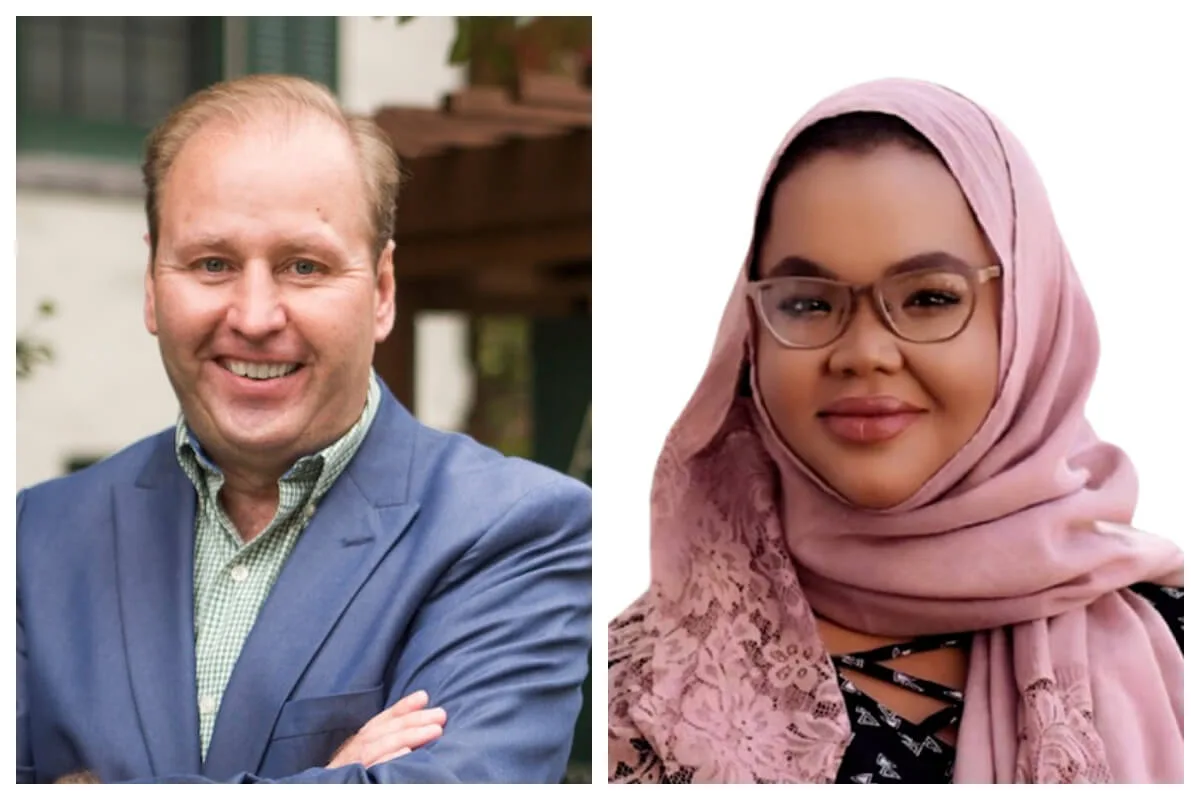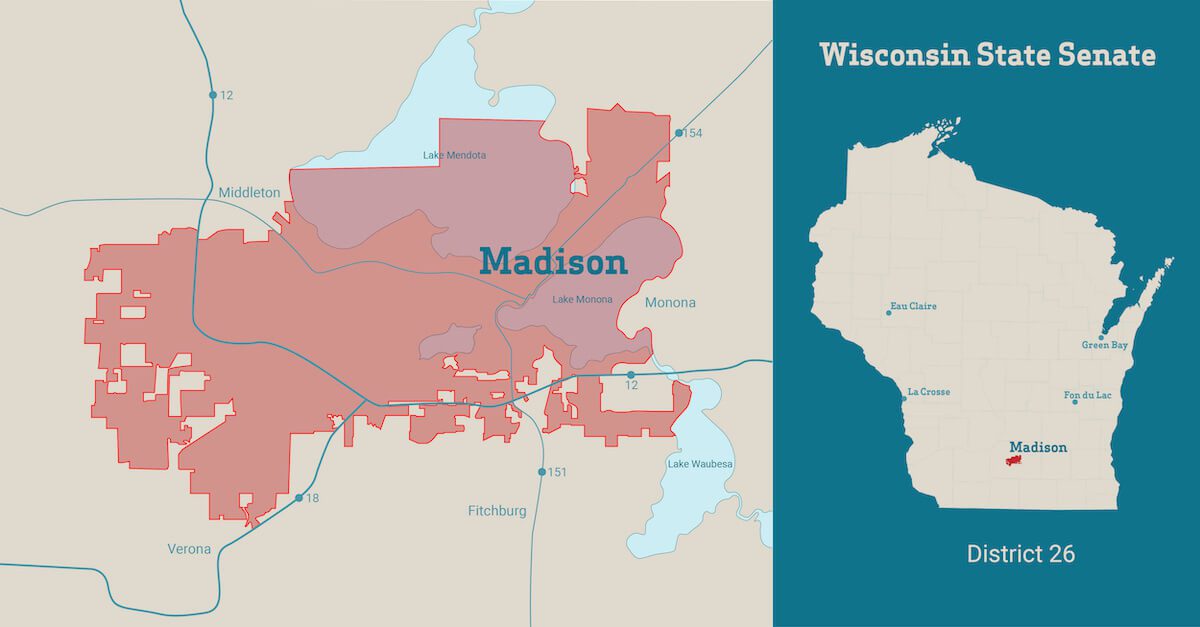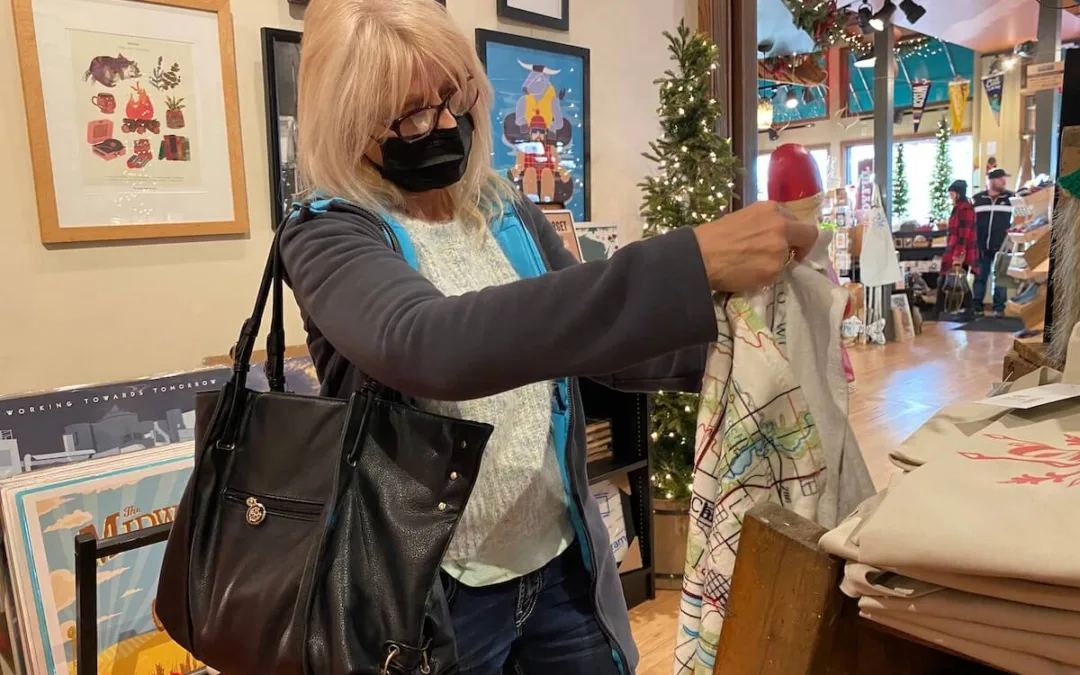
#image_title
#image_title
Seven candidates are vying for long-time Sen. Fred Risser’s seat. Here is a look at two of the Democratic contenders.
Editor’s Note: After 64 years in office, Sen. Fred Risser announced in March that he would be retiring at the end of this term. Seven Democrats are vying for his seat. They will square off in the Aug. 11 primary. With no Republican or Independent registering to run for the seat, the winner of the primary will be the district’s next senator.
The candidates are Brian Benford, Amani Latimer Burris, William Henry Davis III, John Imes, Nada Elmikashfi, Aisha Moe, and Kelda Roys. UpNorthNews sent each of the candidates five questions to answer. Answers from Elmikashfi and Imes are posted below, with those from Moe and Roys available here. The answers given by Benford and Davis posted Wednesday. Read Burris’ comments here.
UNN: What is the top issue facing the people in your district?
Nada Elmikashfi: Many working-class families in our district face incredible gentrification and displacement perpetrated by an affordable housing crisis. 25% of low-income households pay more than 50% of their income on rent in Dane County. Rent has increased 23% in the past 5 years while the minimum wage has stayed the same. Madisonians are having to choose between paying their rent and buying food.
We need rent control, we need laws prohibiting discrimination based on a prospective renter’s source of income, we need laws that limit evictions without just cause, and we need laws that guarantee a right to counsel in housing cases.
For a long time, Democrats have framed the issue of inequity as something immovable. It’s not just gerrymandering, it’s not just Scott Walker that has gotten us here. Decades of inaction and racism in Wisconsin have perpetuated our affordable housing crisis.
From 2008-2010, Democrats controlled the capitol and yet made no real change on housing reform. People in my community are sick of affordable housing decisions being made by representatives who are all homeowners. We need leadership that rents, that truly understands the struggle of working-class Madison, and that will fight unapologetically for tenant protections.
UNN: Describe what unique life experiences would make you both an empathetic and effective lawmaker.
Elmikashfi: Our campaign is a working-class platform that is built upon equity and solidarity. I share a similar story to other immigrants in this country. My parents faced considerable adversity raising a family in Madison.
At a very young age, I became very aware of a deeply hurtful, systemic inequity in Madison made evident by a crumbling healthcare system, gentrification, and disparate educational achievement gaps between us Black children and our peers.
Since then I’ve been an activist, an organizer, and I’ve worked for Gov. Evers, Sen. Shilling, and currently serve on the Sustainable Madison Committee. In my time at the Capitol, I witnessed firsthand how having progressive policy is not enough.
We need to start putting forward candidates with the lived experience of the policies we are addressing. As State Senator, I will fight for justice like my life depends on it, because for Black people like me in Madison, our lives do depend on it.
UNN: Gov. Tony Evers and Lt. Gov. Mandela Barnes introduced a nine-bill package on June 19 aimed at reforming police transparency and accountability in response to ongoing protests over the murder of George Floyd. What are your thoughts on this package?
Elmikashfi: We must defund and demilitarize the police across Wisconsin. Tony Robinson’s death was 5 years ago, that should have been the wake-up call for us. We must not let this opportunity pass us by as well. Gov. Evers and Lt. Gov. Barnes are working within a GOP-held legislature and fighting against a corrupt Wisconsin Supreme Court. Their package, while not coming close to defunding the police, will save lives and is the most we can hope for with our current legislature.
However, this is greater than police brutality. The Black Lives Matters movement offers us a chance to really reflect on how racism is deeply embedded within our society. Wisconsin has not fulfilled the promise of “forward” to the Black community.
While Gov. Evers and Lt. Gov. Barnes must create a bipartisan solution, the Democratic leadership from a safe blue seat in Madison must demand more. We need leadership that is not afraid to discuss fragility. We need leadership who values Black lives more than statues.
UNN: Funding for K-12 education is an ongoing issue in Wisconsin, now exacerbated by the need for virtual learning due to COVID-19. What do lawmakers need to pass to ensure that low-income students in your district are not left behind?
Elmikashfi: Wisconsin’s school funding formula works as designed. Wisconsin is the most segregated state in the country. The property tax school funding system has created one of the more variegated resource gaps and school outcomes out of any state. Under the guise of “local control”, school funding has been used as a cudgel against urban communities, BIPOC, and increasingly, rural communities as well. This system shortchanges so many students in Wisconsin and relies on unpredictable property values to form the bulwark of school budgets.
We must ensure that equitable and sustainable investments are made so that every student, teacher, and school system has the resources they need to succeed. This includes moving away from the property tax school funding system that continues to pass on generations of systemic racism to our children.
UNN: Your district includes a portion of Dane County that has the highest infant mortality rate for Black babies in the country. What could you do as a state senator to begin to address this problem?
Elmikashfi: Racism is a public health crisis in Wisconsin. COVID-19 has highlighted how systemic racism within our healthcare system negatively impacts Black and brown people. Medicare for All would be the first step to ensuring equal access to healthcare for BIPOC (Black, Indigenous, People of Color). Medicare for All will not instantly solve these inequities. Doing so will require addressing the foundations of white supremacy in our public health system. Expanding Medicaid and fighting for Universal Healthcare will, however, take us on the path towards equitable care, investing in the health of communities, and guaranteeing healthcare as a human right.

UNN: What is the top issue facing the people in your district?
John Imes: An Economic Recovery Plan That Protects Workers and Prioritizes Public Health.
As State Senator, I will work to implement the bold, high-road, progressive policies we need and will stand up for local businesses and workers. I believe we can come out of this crisis healthier, stronger, and more resilient as a community, but only if we implement an economic recovery plan that works for all and prioritizes worker health and public safety, provides affordable health care, paid sick, family and medical leave, and direct economic relief.
Our goal should be to make the state a model for high-road practices and provide incentives to those that adopt them and enact legislation requiring them. Providing a livable fair wage, family-friendly benefits, work-life balance, education and technical training and a “just transition”, particularly for women, immigrants, and people of color, will help reduce social/economic disparities and make an economic recovery that works for all possible.
UNN: Describe what unique life experiences would make you both an empathetic and effective lawmaker.
Imes: As a locally elected official, environmental nonprofit leader, small business owner, and married father of four children, I bring a uniquely diverse experience working with stakeholders on issues for over two decades in the 26th Senate District that allow me to engage all points of view more effectively and build the coalitions we need to solve problems and win back a Democratic majority.
I also understand the importance of listening to voters and will take a cooperative, practical, and effective approach to transcend the extreme divisiveness and inaction of today’s state politics and work diligently to enact the high-road, progressive policies that take better care of our local businesses, workers, families, and communities and put people first!
UNN: Gov. Tony Evers and Lt. Gov. Mandela Barnes introduced a nine-bill package on June 19 aimed at reforming police transparency and accountability in response to ongoing protests over the murder of George Floyd. Do you believe this package does too little… does too much to expect it to pass, or is just right? Why or why not?
Imes: A primary goal of our campaign is to enact high-road progressive policies that create a more just, equitable, sustainable, and inclusive economy that works for all. We cannot achieve that goal amid the ongoing problems of unequal justice and police misconduct that is often racially motivated.
The legislative package introduced by Gov. Evers and Lt. Gov. Barnes is a good start to get something accomplished by establishing new standards for deadly force only as a last resort; banning chokeholds and no-knock searches; require officer training on de-escalation techniques; creates a $1 million grant program to mediate conflicts; and includes provisions for reporting use of force and maintaining employment files on officers.
Adding provisions that specifically prohibit racial profiling and requiring officers to wear and properly operate body cameras, would also help create greater transparency, accountability, and justice for all.
UNN: Funding for K-12 education is an ongoing issue in Wisconsin, now exacerbated by the need for virtual learning due to COVID-19. What do lawmakers need to pass to ensure that low income students in your district are not left behind?
Imes: Improve state financial aid to public schools by mandating sufficient funding and prioritize equity through fixes to the school funding formula, particularly for districts like Madison with high numbers of students experiencing poverty and high equalized property values.
Fully fund early childcare including 4k public education, improve broadband technology, and hire a diverse teaching workforce and student support staff including additional guidance counselors, psychologists, social workers, nurses, and mental health specialists to help low income students overcome adversity and improve academic outcomes.
Investing in education and expanding workforce training opportunities in low-income communities will also give young people in our community more options and the confidence to become future leaders.
UNN: Your district includes a portion of Dane County, which has the highest infant mortality rate for Black babies in the country. What could you do as a state senator to begin to address this problem?
Imes: Ensure the next state budget prioritizes affordable childcare, stable housing, living wage jobs, access to quality food options, and community directed social services.
Expand Medicaid services as allowed under the Affordable Care Act to close the coverage gaps in health insurance and help pay for quality prenatal and postpartum care, including home visits and services provided by Doulas and Midwives. Adopt regulations and policy that allow for the expanded use of telemedicine including doctor’s appointments.
Politics

‘Radical’ Republican proposals threaten bipartisan farm bill, USDA Secretary says
In an appearance before the North American Agricultural Journalists last week, United States Department of Agriculture (USDA) Secretary Tom Vilsack...

New Biden rule protects privacy of women seeking abortions
Under the new rules, state officials and law enforcement cannot obtain medical records related to lawful reproductive health care with the goal of...
Local News

Readers Poll: Top Bowling Alleys in Wisconsin
Looking for the best bowling in Wisconsin? Look no further! Our readers have spoken in our recent poll, and we have the inside scoop on the top...

8 Wisconsin restaurants Top Chef judges are raving about
Top Chef’s 21st season is all about Wisconsin, and on-screen, it’s already apparent that the judges feel right at home here. But, while filming in...


